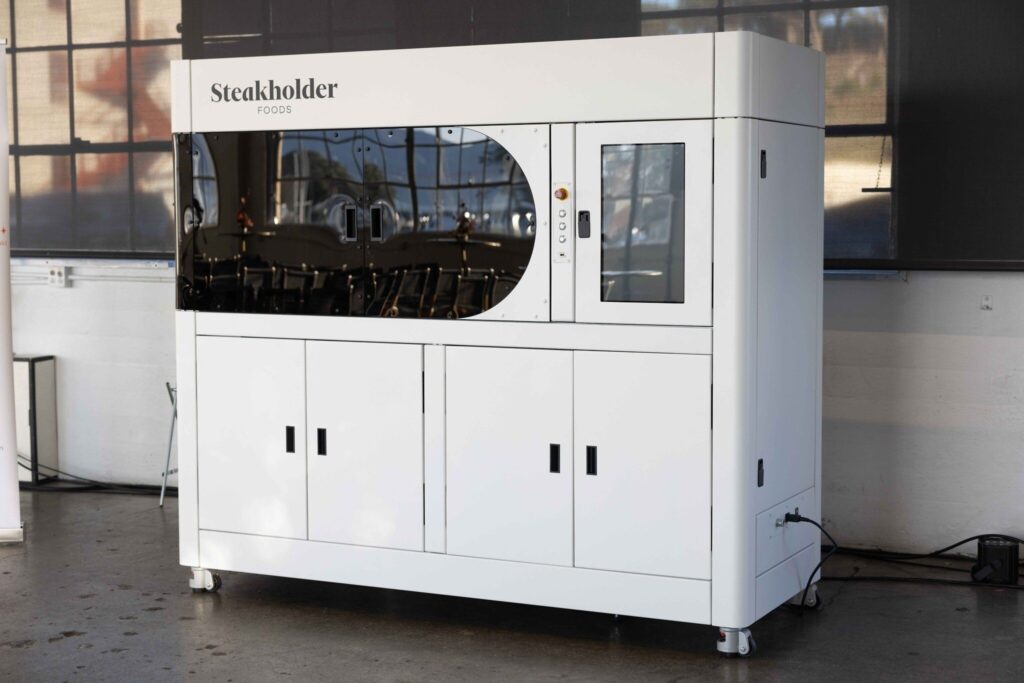
3D printing food tech startup Steakholder Foods has debuted two fish-free seafood products in grocery stores in Israel.
Israeli 3D-printed meat maker Steakholder Foods has commercialised its first plant-based seafood products in the country’s retail sector.
The Rehovot-based firm has developed white fish kebabs and salmon patties, which are now on sale at vegan specialty stores under the brand name Atid Yarok (Green Future). They’re manufactured by meat-free producer and distributor Bondor Foods.
“Seeing first products selling in the market based on our prize-winning premixes is a huge step forward for Steakholder,” said Steakholder Foods CEO Arik Kaufman. “It is an exciting demonstration of how successfully our B2B customers and partners can roll out compelling, scalable, next-generation seafood alternatives to consumers.”
Latest products part of extensive 3D-printed seafood portfolio

Formerly known as MeaTech, Steakholder Foods was founded in 2019 and makes 3D-printing production machines and premix blends for plant-based and cultivated proteins, including beef steaks, white fish, shrimp, salmon, and eel.
The company has developed a DropJet technology specifically for its seafood applications. The 3D bioprinting process combines drops of gel-based materials to create a 3D structure, and allows it to drastically reduce the number of ingredients in vegan fish products.
Steakholder Foods also serves as a B2B supplier of 3D bioprinters and bio-inks for alternative protein manufacturers, allowing them to mass-produce price-competitive meat and seafood analogues.
It has unveiled various plant-based and cultivated seafood prototypes over the years. In 2023, it unveiled the industry’s first 3D-printed eel, using precision layering and a unique mix of materials to achieve the fish’s complex texture. And a month later, it introduced a shrimp prototype using bio-ink developed by its R&D team.
And last year, Steakholder Foods completed a two-year state-backed R&D project with Singapore’s Umami Bioworks to figure out the feasibility of producing 3D-printed cultivated fish fillets at scalable volumes. The two firms are now working with Singapore’s National Additive Manufacturing Innovation Cluster to commercialise the hybrid protein.
The new 3D-printed seafood products, available in 180g packs for 21.90 shekels ($6.50), are made from a base of rice and soy proteins, which are mixed with refined coconut oil, methylcellulose, seasonings and flavourings, and soy protein hydrolysate. They contain 6g of fat per 100g (3g of which is saturated), and 7.7g of protein. And unlike conventional fish, they have zero cholesterol.
First revenue from full product cycle for Steakholder Foods

The seafood industry is marred by overfishing, microplastic pollution, and disease outbreaks. It’s a major contributor to climate change, which in turn has a highly negative impact on the sector. Nearly 90% of the world’s fish stocks are now 80% of the planet’s fisheries have been fully exploited, over-exploited or depleted, according to the UN FAO.
In fact, we could be heading towards a complete collapse of ocean life by 2048, driven primarily by overfishing for human consumption, as well as marine pollution and climate change. This is why 30% of respondents to a 2024 survey by the Marine Stewardship Council said they had been eating less seafood in the last two years. At the same time, over 80% of people had changed their dietary habits in this period, and 43% are doing so for sustainability reasons.
Steakholder Foods’s process generates a fraction of the emissions that conventional seafood does. The latest innovations under the Green Future label represent its first full product-cycle revenue stream, from premix supply to consumer sales. The launch builds on an initial purchase order from September 2024, which followed a pilot rollout and commercial scale-up with Bondor Foods.
Listed on the Nasdaq and Tel Aviv stock exchanges, Steakholder Foods entered an agreement with Alumni Capital to receive a $1.25M private placement in March, alongside an $8M equity line of credit. It has so far secured $740,000 of its $1M Singapore-Israel Industrial R&D Foundation grant over three tranches of funding.
Moreover, the firm has made a major step towards its Asia expansion, agreeing to sell its MX200 3D printer and plant-based premixes to Taiwanese food company Vegefarm, which will commercialise plant protein products in the local market with support from the Industrial Technology Research Institute.
The post Steakholder Foods’s 3D-Printed Plant-Based Seafood Makes Retail Debut in Israel appeared first on Green Queen.
This post was originally published on Green Queen.